Page 5: Ft. Providence (continued)
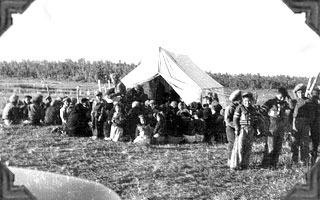
Fort
Providence: Tea dance, July 17-19, 1949
Treaty
Day
Treaty Day each year was a big occasion; that was when the Treaty
Indians who lived outside the settlement gathered in Fort Providence
to receive their annual government payments from the chief magistrate
of the district. According to the station's monthly report in Notes
of Interest, thirty-four tents were pitched by the visitors in June
1951. Our visitors seemed to have a very good time as they enjoyed
their get-together and celebrated the occasion with a "tea dance."
Dr. Truesdell was the chief magistrate of our area and he arrived
for the ceremonies accompanied by a medical team to provide any needed
services, including X-rays.
Treaty day was also a convenient time for Native trappers to seize
the opportunity to complain about the number of beaver that hunting
regulations allowed them to trap in a season. The radio station was
very handy for anyone who wished to send irate messages to the authorities,
such as their Member of Parliament or, as one complainer addressed
his message, to Prime Minister Mackenzie River King.
"The Daily Round, the Common Task"
Cooking provided a challenge or two. We had to ration our year's supplies
carefully so that they would last out the full year before the next
delivery was made, and at the same time we tried to compensate for
the almost complete lack of fresh produce. We had to use our ingenuity,
which was an interesting exercise. I also found myself quite enjoying
baking bread a couple of times a week. The children had fun forming
the dough into different shapes for buns, airplanes being one of their
favourite models.
Our kitchen stove was an clever contraption, basically an oil-stove
with a small electric fan attachment blowing its tiny flame up to
a respectable height and heat. It was an excellent stove with a high
back that had a very convenient shelf on which one could put bread
to rise. If water was kept simmering on the stove underneath, the
bread turned out delightfully light.
For most of the year, looking after the children and the house, cooking,
mending, and sewing, plus baking bread, kept me too busy to be bored.
In the winter, though, one did tend to feel "cabined, cribbed,
confined" and I could understand why symptoms of cabin fever
sometimes developed in the settlement during this season, and why
feuds would occasionally ensue between people. On our neutral territory,
though, it was rather an annoyance when someone walked out of the
house in a huff because the other party in the feud had arrived.
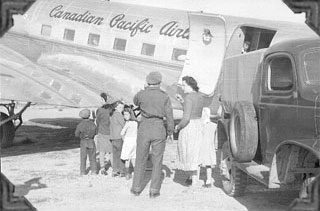
Meeting
the mail plane: Ann Schoales talks to one of the radio operators while
her husband, Frank Schoales, the Hudson's Bay manager and local postmaster,
collects the mail from inside the plane.
The
Mail Plane
The arrival of the mail plane was always an exciting event for the
settlement. Normally scheduled to arrive twice a month, the big Dakotas
were unable to land during the six weeks each of winter freeze-up
and spring thaw. During these periods the mail would usually arrive
in a smaller Norseman plane, but only if conditions were suitable
for landing. At times neither the airstrip nor the river would be
suitable for a plane to land on, whether it was on wheels, skis, or
floats.
The Hudson's Bay trading post manager was also the postmaster and
was responsible for estimating the condition of the airstrip, which
he would check before the time the plane was expected. When the radio
station informed him of its expected time of arrival, he would, if
conditions were suitable, give his permission for the plane to land.
He would then rush out to the airstrip in his truck to collect the
mail, usually accompanied by the radio station truck and anyone else
who wanted a bit of excitement.
After a delay at the HBC post, for sorting, we would get huge sacks
full of newspapers, magazines, and letters, and perhaps a parcel from
Eaton's. We subscribed to the Ottawa Citizen, the London Sunday Times,
Woman's Journal, and Life. It was always fascinating to find out what
had been going on "outside" during the previous month or
two and to catch up with news from home.
Weather
The sky was usually clear except on very cold winter days, when the
smoke from the chimneys of the settlement hung in a low haze just
above the roofs of the dwellings. The stars, whose twinkling was undiluted
by city street lighting, shone very brightly in the cold, clear nights,
and the northern lights were spectacular and wonderful to watch. Sundogs
- a prismatic effect causing spectacular "mini-suns" on
a halo around the sun - made a fascinating addition to winter's special
effects.
I had once read a story set in Alaska that described how words spoken
outside on a very cold day would freeze. On one extremely cold winter
day, the mercury in the official thermometer dropped below the lowest
temperature marked on it. This provided an excellent opportunity to
check the facts of the story, so I asked Dick to say a few words on
his way back to the station after lunch. With great interest I watched
from the kitchen window as he paused several times on his way along
the boardwalk to speak. Each time, the vapour from his breath froze
and hung in the air where he had stopped, leaving a trail of little
clouds along his route to the station. It was fascinating to discover
the possible origin of this story.
Temperatures recorded during the year ranged from a high of 92ºF
(34ºC) in June to a low of -57ºF (-49.4ºC) in December.
For much of the winter it was too cold to snow, and although the snow
had to be shovelled to keep the boardwalks clear, this was no more
work than in many cities farther south. In the spring, when the temperature
reached zero (32º Fahrenheit) and the sun shone brightly, it
felt amazingly warm in contrast to the colder winter weather. "The
boys" would seize the opportunity to take off their shirts and
sunbathe outside the station.
Usually the only sound to be heard in the settlement in winter was
the melodious howling of the tied-up dogs, or the crack of a whip
and the sound of harness bells as a dog team trotted along pulling
a sled. On summer nights the loud hum of mosquitoes outside the screened
windows seemed fierce and menacing. These pests made it impossible
to enjoy a summer picnic without a smudge fire to sit around and a
generous covering of mosquito repellent. No-see-ums and biting flies
joined this hungry horde. If the children played outside, it was imperative
to make sure that they were suitably dressed and their faces and hands
protected by repellent.
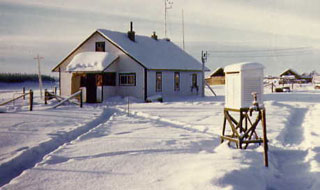
Signals station with weather screen at right
Signals
Duties
The North is the cradle of the weather systems of Canada and the United
States, and meteorological data from this area is vital for long-range
weather forecasting. Weather reports were therefore an extremely important
part of the duties of the Signals station staff.
Every hour, day and night, the operator on duty checked the thermometers
inside the "weather screen" outside the station and recorded
the temperatures. The wind speed and direction were checked inside
the station, by means of an anemometer connected to a wind-vane on
the station roof, and the station's seismograph readings were also
noted. The height of the cloud cover was estimated visually, sometimes
by shining a searchlight at the sky. The barometric pressure and amounts
of rain or snowfall were also recorded. Further weather information
was obtained by inflating a weather balloon and sending it soaring
into the air. The children were very impressed by the balloon launches.
Occasionally, as a special treat, they would be given one of the big
red balloons to play with.
At the end of each week, and of each month, summaries of all these
reports were compiled and sent to Headquarters in Edmonton. When the
station staff were reduced by two in October 1950, the hourly weather
reports became one synoptic version every six hours, with hourly reports
provided only upon request. The staff reduction was made necessary
by a shortage of radio operators. During this period, they were more
desperately needed overseas with the Canadian troops who were taking
part in the Korean War.
Weather information was also vital for the pilots of the planes that
landed, took off, or flew over Fort Providence, whether they flew
bushplanes, commercial airliners, or military aircraft. An essential
part of the station's duties was supplying this information to the
planes, keeping track of their flights, and notifying their destinations.
Riverboats also needed to send and receive messages, usually about
their progress along the river. The operators also transmitted and
received messages from and to the inhabitants of Fort Providence.
Less frequent customers were oil companies drilling in the neighbourhood.
We were all intrigued when one exploration team arrived in a helicopter;
we were used to seeing airplanes only, varied as they were by their
landing gear - wheels, floats, or skis.
The station's duties also included providing the settlement with its
minimal local telephone system, which served, on a party line, the
RCMP, the HBC post, the single and married quarters, and, of course,
the station itself. A line to the Roman Catholic mission was added
in 1951. Subscribers were asked not to pick up the phone when it rang
four times, as this was the RCMP's number - curiosity as to what crime
might be in progress had to be satisfied at some later date!
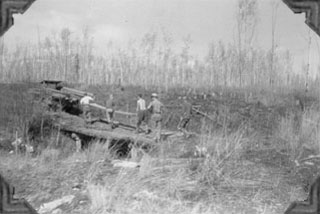
The road to the airstrip, spring repairs: Bill Aird (RCASC), Dick
Watts (RCCS),
Art Fieldsend (RCMP), and Frank Schoales (HBC).
Another
chore, shared by other inhabitants of Fort Providence, was that of
keeping the road to the airstrip in good enough condition to enable
the two vehicles of the settlement - the Signals and Hudson's Bay
Company trucks - to meet the planes when they arrived.
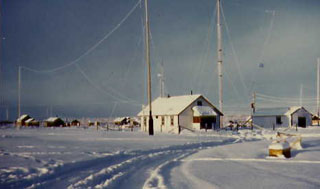
Radio station (left) and engine house (right)
Engines
The names of the engines - "Lister" and "Waukesha"
- were not words that one was eager to hear. Their mention usually
indicated some depressing mechanical problem. It was indeed very rarely
that the monthly report did not include the melancholy "trouble
with engines." The staff expended much time and effort maintaining
these engines, which were absolutely essential for the station, as
they enabled the generators to produce power, light, and heat for
the buildings in the compound.
Most important of all the station's needs, at least to the powers-that-be
in HQ, was sufficient power to keep the station on the air. Even regular
overhauls failed to prevent the many problems that occurred as one
part of the engines after another needed repair or replacement. If
an urgent replacement was needed, it had to be flown to the station
from "outside." The station mechanic/operator and his assistants,
the rest of the boys at the station, needed patience and perseverance.
The cook and I did our best to sympathize and provide what we hoped
was comfort and support in the way of refreshment and encouragement.
Electrical power was the lifeblood of the compound. The station was
on the air for twenty-four hours a day, which was difficult to achieve
when it was short-staffed. The staff were working extra shifts when
an eagerly-awaited replacement mechanic/operator arrived in March
1950. On the way to the station from the airstrip, he was asked if
he knew Morse. He replied, "No, who's he?" He left Fort
Providence in June, never having learned how to send and receive in
code - the usual troubles with the engines had kept him much too busy!
Mail
and Messages
Office procedures took on a hectic pace when the twice-monthly mail
plane arrived on its flight north, as it always brought mail from
HQ in Edmonton. This had to be answered at once so that replies could
be included in the mail going out on the return flight two days later.
It made for a very busy weekend for whoever was in charge of the station.
Non-mail communications from Edmonton were sent and received in Morse
code, as were all other messages. When they were on duty, the more
experienced radio operators preferred to use a "bug" when
transmitting. This was a faster, more sensitive, but more difficult
to use, version of the Morse key. Instead of moving up and down, the
bug's key was moved from side to side, unlike the standard army-issue
key, so familiar from movies in which the valiant operator sends an
SOS as his ship sinks or, in war movies, a "V for victory"
signal. I think that these two messages must be the only Morse code
recognizable to the general public - perhaps permanent memorials to
this past era.
The uninitiated were impressed to discover that an operator could
read and understand the dots and dashes coming from the radio set
as easily as if he were reading a book. When Dick was at work in his
office on a mail weekend, he could compose a letter to HQ on his typewriter,
answer a question from someone in the station, and chuckle at a joke
being transmitted in Morse code from another station - all at the
same time!
Love
and Marriage
After the end of the war, a soldier was no longer required to obtain
his commanding officer's permission before he could marry. However,
the army authorities seemed reluctant to allow total freedom of choice.
They were not in favour of intermarriage between the signalmen and
the local women. I am not sure whether this was from some paternalistic
feeling of responsibility towards the young and inexperienced soldiers
or a relic of the earlier marriage regulations. Perhaps it was because
of the difficulties of posting a man married to a Native northerner
to other parts of Canada.
Whatever the reason for this concern, one result was that whoever
was in charge of a northern station had to keep track of the love
life of his staff and decide if their intentions were both honourable
and serious. If he decided that they were, he had to keep HQ informed.
This was hardly an easy matter to determine and caused many a headache
for the unfortunate who had to do it. To add to his troubles, all
personal information had to be transmitted in a confidential code,
thus adding extra coding and decoding time and labour to an unpleasant
duty.
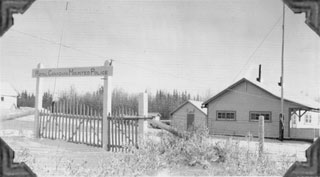
RCMP
compound, 1949
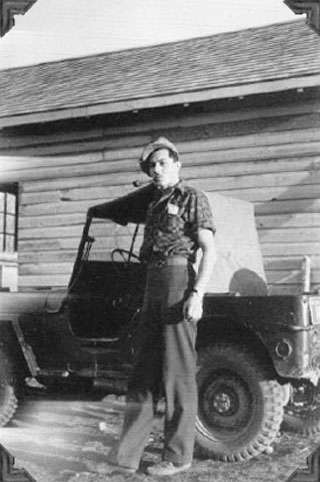
RCMP
Constable Art Fieldsend. - 1948
Law
and Order
Whoever was in charge of a station was sometimes required to act as
the local Justice of the Peace. This office devolved upon Dick, and
he was duly appointed a magistrate "with the powers of one,"
which seemed to mean that he had no power to perform a marriage ceremony.
His duties were not overwhelming, as there did not appear to be an
enormous amount of crime in Fort Providence, apart from illegal trapping
and some local parties involving too much homebrew and subsequent
fights.
The local RCMP duly informed Dick of the details of any cases coming
up for judgement. In court he listened with conscientious patience
to the constables' accounts and to those of the accused, sometimes
through an interpreter, who translated, if necessary, from Slavey.
After one prisoner gave a long and impassioned speech in Slavey, Dick
was a little surprised to hear the translation - "Not guilty"!
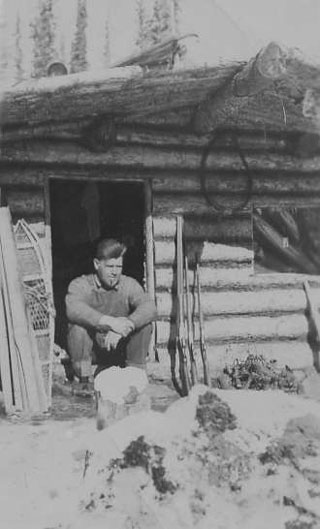
Sandy Davidson at one of his trapline cabins
The
White Trapper
Sandy Davidson, the one white trapper in the settlement, lived just
outside our compound fence, facing the main road. His devoted team
lived in their own doghouses behind his cabin.
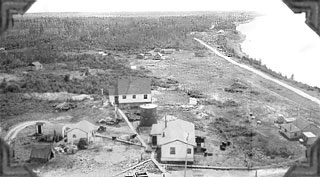
L
to R: PMQ, oil tank, single quarters, and Sandy Davidson's cabin.
The doghouses are to the left of his house, level with the oil tank.
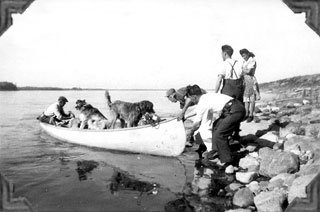
Sandy
leaves for his trap lines
Every
year during the summer, Sandy took supplies to his winter cabins by
plane. In the latter part of August or early September he left Fort
Providence for his traplines, near the Horn Mountains. He travelled
by canoe, and his dogs either rode with him or ran along the riverbank
beside the boat. On their routine patrols during the winter, the RCMP
constables would check on him regularly and bring back news of how
he was getting on and how good or bad the trapping was that year.
Each spring or early summer he would return from his traplines with
a load of wonderful furs. After his winter alone except for his dogs,
he would spend an entire weekend recovering from the isolation by
talking nonstop to the Signals staff on duty. As the shifts changed
every eight hours during the forty-eight hours of the weekend, he
would carry on with his recital to whichever operator was on duty,
making up for his long winter's silence. His tales of winter adventures
and the different animals he had encountered were fascinating. He
would talk about his dogs as if they were fellow adventurers, specially
his lead dog, Charley.
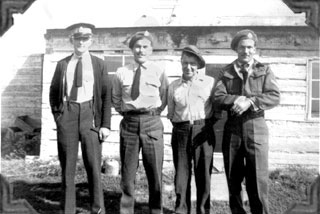
Jimmy
Carter (RCMP), Hank Hoiland, Sandy Davidson,
and Joe Funfer in front of Sandy's cabin.
In the summer Sandy occupied himself with making homebrew, hiding
the bottles under the floorboards of his cabin when he saw either
of the two RCMP constables approaching along the road. The boys at
the radio station had a standing invitation to join him for a "cool
one." When Dick, Jill, and I paid him our first visit, Sandy
immediately offered us a beer. Before I realized it, he had included
Jill, giving her some in the cap of a whiskey bottle - she loved it!
We finally managed to convince him that it was not an appropriate
drink for one so young; she had to wait a good few years before she
was able to repeat that first experience.
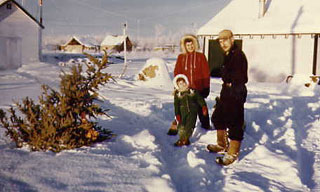
Jean,
Jill, and Curly Folkins, burning the Christmas tree
Curly
Folkins
There are quite a few northern names that I cannot easily recall,
but there is one that I will never forget - Curly Folkins.
The fence that surrounded the Signals compound enclosed only the back
of our house. The other three sides of the house were open to the
surrounding bush. To enable our little girl, Jill, to play outside
safely, we fenced in some land in front of the house. This also enabled
us to make a garden in which we managed to grow lettuces and a few
flowers during the long, sunny days of summer. The wire fence, which
we had thought impossible for a toddler to get through, unfortunately
proved to be not impossible at all for Jill. One horrible morning
after letting her out to play, I looked outside to see no little girl
in the garden.
This was the time of year when the ice was breaking up on the river.
I rushed over to the station, and Dick and the boys immediately dispersed
to look for her. It was Curly Folkins who found Jill - just as she
was about to step onto the broken-up ice of the river. She was in
pursuit of a puppy that must have wriggled its way into our yard through
one of the squares of the wire fence. She had then followed it as
it squeezed its way out again.
Northern rivers and lakes can be a dreadful danger for children. During
our posting to Aklavik, two children were drowned in the Mackenzie
when they fell into a hole in the ice where people had been cutting
ice to melt for water. I can never thank Curly enough for finding
Gillian and saving her from a similar fate. This whole incident probably
lasted no more than an hour, but at the time it felt like an eternity.
Recreation and the Social Whirl
We almost invariably provided our own entertainment and recreation.
The men indulged in such sports as fishing (from the shore and from
boats), shooting (ducks, geese, and prairie chicken) in season, exercising
dog teams, sunbathing, and swimming in the river during the short
summer season. Card games were always in fashion, and exchanging visits
with the current Hudson's Bay family and the RCMP constables was an
ever-present way to pass the time pleasantly.
It was always a pleasure when the local HBC post manager had a wife
and family, as it meant that female company was available and there
were other children for mine to play with. Two families were posted
to Fort Providence during our time, with one or two single managers
sandwiched between them for a fairly short period. Both the Schoales
and Hunt families were great company and good friends, and goldmines
of valuable northern expertise.
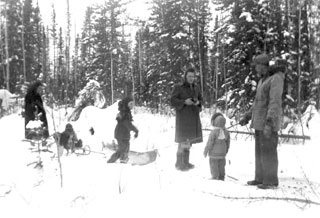
Spring
"picnic" with the Schoales family - Jean and
Jill, Veryl, Anne, Lynda, and Frank Schoales
Throughout the year, visits and invitations to meals were exchanged
between the single quarters, married quarters, the RCMP post, and
the Hudson's Bay trading post. Although the mission staff kept pretty
much to themselves, we occasionally took the children to visit the
sisters at the mission school. The Christmas season was an occasion
for gathering together by the white population, and on New Year's
Day the Mission staff and the Natives would make ceremonial visits.
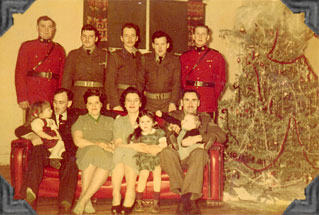
Christmas
1951: Front row: Lynn, Ken, and Peggy Hunt
(HBC);
Jean, Jill, Dick, and Chris Watts
Back row: Norm Hambley, Pat Paterson, Curley Folkins,
Bert Rupple, Tommy Scott
The two resident families much appreciated the trouble that the single
quarters "boys" took in 1951 to provide a decorated Christmas
tree (cut from the bush) and Christmas gifts for the children. To
do this required thinking ahead - sending a mail order outside in
time for the parcels to arrive by air before the festive day. It was
very kind and thoughtful of them.
During our time in Fort Providence, the occasional square dance was
held at the single quarters, as it was, apart from the Mission, the
only building large enough to hold a gathering. The dances were highly
successful and the Natives, both men and women, were very energetic
dancers. Angus McLeod, the Native clerk at the HBC trading post, was
an experienced and effective caller. A good time was enjoyed by all.
There was a general election in 1949, and some excitement was aroused
by the separate visits of two candidates. Accompanied by their small
entourages and some bottles of good cheer, they stayed for a few hours
in Fort Providence and then departed in the bushplanes in which they
had arrived.
One year, the National Film Board loaned a sound projector to the
mission school, and the settlement looked forward to an exciting winter
schedule of movies. Alas, after one or two showings of a program of
educational films - duly censored by the priest, who was operating
the equipment - the sound system failed, and the anticipated entertainment
ceased for the rest of the winter. As an example of the above-mentioned
censorship, when the male skater of a pair of ice skaters placed a
supporting arm around his female partner, a hand was hastily placed
over the projector lens to hide this shocking scene!
Both the HBC and RCMP posts possessed small and valued libraries,
and I was lucky enough to be allowed to borrow from them. We mostly
relied on receiving books, magazines, and papers whenever the mail
plane arrived.
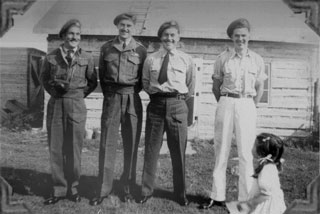
Jill
admires the annual inspection turnout, August 1949:
Joe Funfer, Dick Watts, Hank Hoiland, and Bill Aird (the cook)
Annual
Inspection
Visitors from outside also provided entertainment. Their reception
sometimes required quite extensive preparation, such as for the army
inspection team that arrived once a year from HQ in Edmonton. This
ceremonial visitation meant that everything on the station had to
be in apple-pie order, including the boys. For the occasion, besides
polishing cap badges and pressing uniforms, they reluctantly replaced
their comfortable Native-made moccasins with polished army footwear.
Arriving at or about the same time as the Signals inspection team
were the medical and dental teams. This ensured a complete spring-cleaning
each year, not only for the station, but for its personnel too.
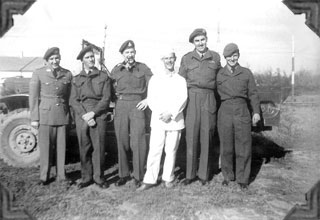
Summer
inspection, August 1950: Bob McKenzie,
Bev Berry, Curly Folkins, Al Miller, Dick Watts, and Bert Rupple
After
coping with the needs of the station staff and dependents, the medical
and dental teams would treat any inhabitants of the settlement who
needed their help. The dentist's travelling equipment included a sergeant
who pedalled away on the machine powering the drill, while the patient
sat in a small portable chair. To have a tooth filled or pulled in
this milieu was a daunting experience, but one much appreciated if
desperately needed. Seven months pregnant, I bulged over the edges
of the chair as the dentist offered an interesting observation. The
roots of the back tooth he was pulling were hooked exactly like the
teeth of Eskimos he had treated in the Arctic, and was thus very difficult
to extract. At least this ethnological titbit gave me something to
think about during the procedure!
Other visitors of interest included the famous Inspector Larsen, who
had made the first successful west-to-east voyage through the Northwest
Passage in the RCMP's St. Roch. When we were invited to meet him at
the RCMP quarters, I was impressed by how much he enjoyed talking
to my small children. He encouraged little Chris to page through a
book from the Mounties' library, while the constables, understandably,
looked a little worried about the damage a small boy might inflict
on its pristine condition.
The renowned bush pilot Max Ward was another famous visitor, and we
entertained him to supper. Anyone who has travelled on Wardair, which
he founded later, cannot help but wish that it were still in existence,
providing the most comfortable flights ever.
Lost
in the Bush
When Ken Hunt, the manager of the HBC post, went hunting one Saturday
morning, his wife expected him back with a couple of prairie chickens
for supper. But time went by, and by nightfall he had not returned.
It was fall, and the weather was beginning to get cold. Poor Peggy
Hunt was really worried. I went down the road to the HBC post to stay
with Peggy and her little girl, Lynne, while everyone from the settlement
who was able went out to look for him.
The Sigs station had a searchlight whose beam was used for estimating
the height of the cloud ceiling. It was turned on in the hope that,
if Ken had become lost, he might see it shining up into the sky and
thus be able to find his way back to the settlement. But there was
no sign of him.
The following day everyone again went out looking for him, again with
no success. Just towards dusk, Ken reappeared at the outskirts of
the settlement, to the relief and joy of the searchers. It turned
out that, although an experienced northerner, he had indeed become
lost. This is fairly easy to do in that featureless expanse of the
bush.
In order to orient himself, Ken had climbed a tree, and he had indeed
seen the searchlight's beam. He had lit a fire and spent the night
in the bush before making his way home, very tired and dirty. The
whole settlement, as well as his family, was delighted to see him
return safe and sound.
Yellowknife
While looking through some old papers recently, I found a memorable
bill from the Red Cross Hospital in Yellowknife. It was dated December
14, 1949, and asked me to settle my account, as they had failed to
charge me for the October portion of my stay there. The total bill
for seven days, October 30 to November 5, was $84.00. And more than
worth every penny of it, too, as the medical expenses were for the
birth of our second child, Christopher, on October 30.
In the more isolated parts of the North, delivering a baby was more
complicated than it was outside. The army would have paid for my trip
to Edmonton, but I knew no one there, so I preferred to stay closer
to home. This meant chartering a plane to and from Yellowknife, arranging
somewhere to stay, and estimating how long I would spend there. Gillian's
arrival was three weeks late, but I must have improved with practice,
as Christopher, bless his heart, arrived exactly when I expected him.
Getting to Yellowknife was the first stage of the expedition. On the
day the chartered plane was supposed to arrive to pick me up, the
weather was so poor that we expected it to come on the following day.
However, it arrived as planned, and I, alas, had eaten a hearty lunch.
As the river was just beginning to freeze up, it was impossible for
the Norseman floatplane to edge right up to the riverbank at the RCMP
compound. The efficient Mounties kindly pushed me out to the plane
in a small boat. I awkwardly clambered up into the plane to sit behind
the pilot. He greeted me with, "If I'd known you were pregnant,
I wouldn't have come today."
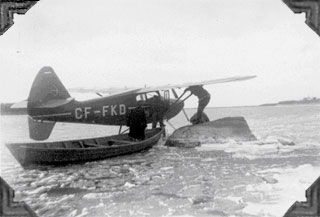
Getting
on the plane to Yellowknife
We
took off, and soon that familiar queasy feeling came over me. I asked
the pilot if he happened to have a vomit bag in the plane. He answered
that he had none, but if I looked behind me I would find a loaf wrapped
in waxed paper, and I could use the bread wrapper. I thanked him and
used it gratefully, much relieved - in more ways than one.
As we flew on, the short day began to draw in, the sky clouded over,
snow began to fall, and a strong headwind started to blow against
us, making progress difficult for the plane. The pilot seemed anxious
and asked me a couple of times if I could see anything, but all I
could see were snowflakes falling on the grey lake below. I wondered
if we would have to set down before we reached Yellowknife. I didn't
really care if we did, so long as we landed somewhere.
At last we caught a glimpse of Yellowknife across the grey water.
We landed at a deserted dock at five o'clock, fifteen minutes after
our expected time of arrival, with the needle on the gas gauge nearly
at "empty." The pilot commented that it had been a rough
trip, and helped me out of the plane. He showed me a small building
from where I could phone for a taxi.
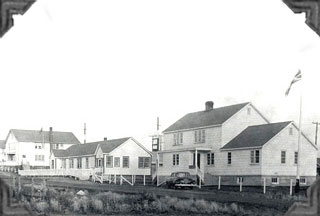
Yellowknife:
The building in the background is the
liquor store, in the centre the RC Signals Station and
in the front the RCMP detachment.
There
was, very fortunately for me, an NWT&Y Sigs station in Yellowknife.
The WO in charge, George Batty, and his wife had very kindly offered
to put me up for a week or so before and after the birth of the baby
at the hospital. Before I could even use the telephone at the dock,
kind Mrs. Batty, warned of the plane's arrival, drove up in a taxi
to take me home with her. The Battys made me very welcome, and their
adorable little girl, Carol Lynne, reminded me of Jill.
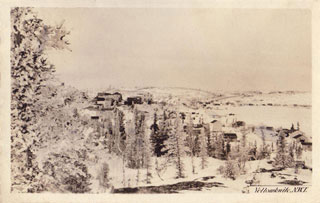
Yellowknife
(Post Card)
A
pleasant few days ensued as I enjoyed such metropolitan delights as
daily walks with Mrs. Batty to the coffee shop of the Ingraham Hotel
on the main street, for refreshment and conversation with any friends
who turned up. We also went to a cinema a couple of times, and this
was a great treat.
We visited the local school, just across the road from the PMQ, to
see their Hallowe'en parade. That evening, my labour pains began.
Accompanied by Mrs. Batty, I adjourned to the hospital at eight o'clock
the next morning, a Sunday.
Hospital
The nurse who greeted me at the hospital said that she hoped I would
hurry up and have the baby soon, because the doctor was anxious to
go hunting. I did my best to oblige and things progressed in the usual
way. In the delivery room the doctor told the nurse to give me some
chloroform for the pain, cheerfully informing me, "They don't
believe in using this in England." I vaguely remembered that
Queen Victoria had had chloroform during childbirth when it was a
brilliant new procedure, but I could not help thinking that there
had probably been more recent advances in anaesthesia. However, since
the Queen survived and produced umpteen more children, it seemed likely
that all would be well.
The assisting nurse seemed unsure of how to administer the chloroform,
but the procedure was successful, even if it was in the Victorian
mode. Christopher turned out to be a beautiful, healthy boy and was
as good as gold. The doctor seemed quite pleased at the end with everyone's
behaviour, including mine and the baby's. I discovered later that
the regular doctor was on leave outside, and my doctor's usual patients
were workers in the Yellowknife goldmines!
It was rather dull in the recovery ward, as I was the only one there.
My only visitors were the two parish priests, one Roman Catholic and
one Protestant, carrying out their pastoral duties. The RC priest
was worried that the Russians would invade Canada through the NWT.
I reassured him that such a thing was not at all likely. Having seen
what an effort it took to start our station truck and water pump and
to keep them going in winter temperatures, I couldn't see an army
of tanks and trucks from Russia managing to cut through thousands
of miles of bush from the Arctic coast to Yellowknife. It felt quite
safe to state categorically that it was impossible.
After a week in hospital and a further week's stay with the Battys,
I felt strong enough to charter another plane for the trip back. This
time the pilot was the well-known bush pilot Ernie Boffa, who was
as pleasant and thoughtful as he was efficient.
Some fresh food was available in Yellowknife because of its much more
frequent plane service than ours. It seemed sensible to take back
as much as I could, so, carefully fulfilling the requests from Fort
Providence, I ordered as much as I could, including some Christmas
turkeys. By this time in November the lake and river were frozen over,
and the planes were on skis for the winter. It was difficult to get
the heavily loaded Piper Cub off the ice, and two men had to rock
the wings to free the skis. As we zoomed up into the air, one of the
turkeys fell from where it was stowed somewhere above me, luckily
missing the baby.
The day had started with fine weather, but by the time we were halfway
across the lake it was grey and overcast again. Ernie said that he
might have to put down but didn't think that this would be a good
idea because of the baby. He thought it wiser to return to Yellowknife,
so we turned around and went all the way back. It was a tremendous
disappointment.
Next day we set off again, and this time we made it to Fort Providence
and landed on the airstrip. Ernie settled the baby and me in one of
the H-huts while we waited for the truck. When it arrived, he immediately
presented Dick with a bill for the flight - even before he got to
see his new son. We forgave Ernie though, as we knew he was anxious
to get back to Yellowknife before dark
It was wonderful to be back home. When we arrived, Jill was down the
road with the Schoales, happily playing with their little girls. After
we had settled Chris in his crib, Dick went to get her and introduce
her new brother. She was thrilled to see him and looked forward to
having someone to play with all the time.
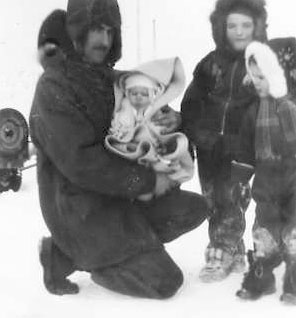
The new baby's first photo: Dick, Chris, Veryl Schoales,
and Jill, November 1949
The
Sigs boys were pleased, too. Apparently the whole settlement had known
I was pregnant practically before I knew myself, and they had been
betting on the sex of the infant. The Signals staff had, fortunately,
all bet that it would be a boy!
The news of Chris's birth had arrived in Fort Providence by radio,
and the operator on duty had rushed over to our house to give the
proud father the news. He found Dick inside the big water tank in
the basement, cleaning it out. This incident was included in the station's
monthly report in the system's publication, Notes of Interest, and
was immortalized by the clever cartoonist who illustrated every Notes,
giving its readers much amusement.
Off
the Air
Two weeks after my return to Fort Providence with the new baby, we
went through a very disheartening experience. The engines, which enabled
the station generators to supply power to light and heat the station
and the quarters, ceased operating one after another - just when the
weather was starting to get uncomfortably cold. It was November, and
the high temperature that month was 50ºF (10ºC) and the
low -20ºF (-29ºC). In December, while the troubles continued,
the high was 39ºF (-4ºC) and the low was -50ºF (-45.5ºC).
Dick discovered our situation when he woke in the middle of the night,
switched on the lamp over our bed, and no light resulted. The regular,
comfortable putt-putt of the engines was missing - nothing was to
be heard except the occasional howling of the dog teams tied up outside
the cabins. After the emergency equipment was used to send a message
to HQ explaining our predicament, silence perforce ensued. We were
off the air!
As our plane service was rather limited, obtaining replacements for
the defective engine parts by air was not the easiest thing in the
world. At this especially crucial time, the eagerly awaited parts
were bumped off the plane in favour of some passengers from Fort Simpson,
the Signals station south of Fort Providence. If we were not to freeze
for another month, a charter plane was needed to deliver the urgently
needed parts. HQ in Edmonton finally gave permission for this; their
main concern seemed to be that the weather reports were not coming
through. In the civilized environs of Edmonton, it was perhaps not
immediately obvious what lack of power meant for those living on the
station.
I could not help but be concerned about my little girl and her baby
brother, who was only three weeks old. No electricity meant no lighting
except what was provided by candles and, later, a camping lantern
kindly loaned by the Hudson's Bay post. It meant no heat except from
that provided by the minuscule flame in the cookstove. We did have
an oil-fired space heater, but we had to put it in the basement room,
where our year's food was stored, so that the canned goods would not
freeze. Fortunately it was possible to shut off the kitchen and the
living room next to it from the rest of the house. With the aid of
the tiny flame in the cookstove, we were able to keep those two rooms
at a reasonable temperature, but the rest of the house was about 40ºF
(45ºC).
The RCMP constables came over to cheer me up and presumably to rescue
us if things deteriorated further. I believe that the problem was
eventually found to have been caused by the new engine bases that
were put down in the previous summer, which turned out to be not quite
level. It was an occasion for celebration when the repairs were finally
completed, the lights came on, and we could start the furnace again
and have life return to normal!
After this interlude, life continued according to our usual routine
until July 1951, when we received sad news of the death of Dick's
father and went on leave to Ottawa. The children were introduced to
the delights of "outside." On the way, they had a wonderful
time in the Macdonald Hotel in Edmonton, where the kind girl in charge
of the elevator let them ride up and down as many times as they wanted.
They also had fun flushing the toilets, over and over again.
On our return to Fort Providence we heard that we had missed the big
excitement. A big CPA plane, on its regular trip to Norman Wells,
had suffered engine trouble, and its twenty-five passengers had to
be put up overnight while repairs were made. Although we were sorry
to miss this event, it was convenient that our house was vacant and
its beds available - there weren't very many spare beds in the settlement.
The only trace of the passengers stay in our house was a cigarette
burn on a bedside table.
Life carried on in the usual way until July 1952. After four years
in Fort Providence, Dick was promoted, and it was time once again
to move, as is customary in army life. Our new destination was the
most northern station in the System, Aklavik, where Dick was slated
to take charge of the radio station.
[Next
Page]
Pages: [1] [2]
[3] [4]
[5] [6] [7]
[8] [9]
[10] [11]
[12] [13] [14]
[15] [16]
Return to top of
page
Return to the Watts
Family page